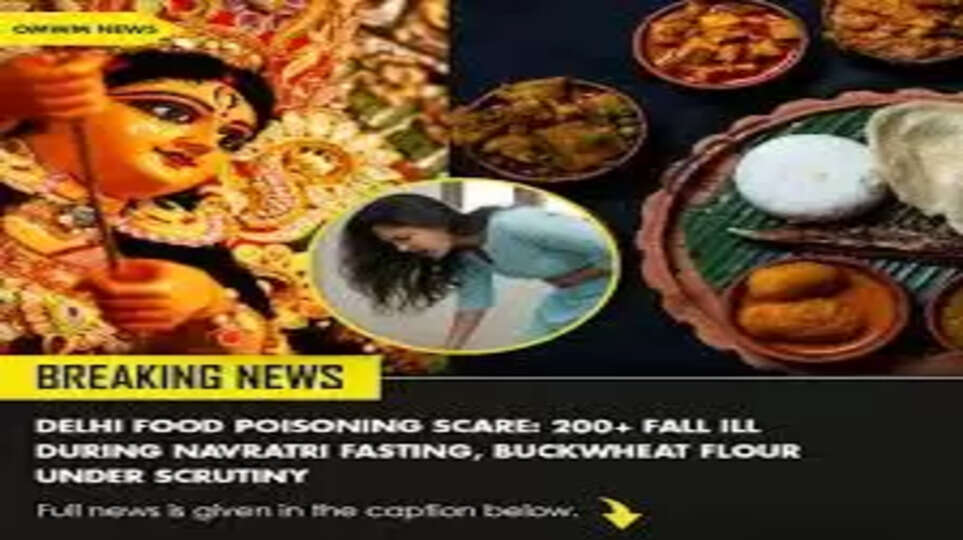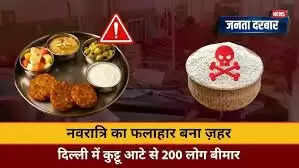Navratri Food Poisoning in Delhi: 10 Facts About Buckwheat Flour Contamination
Over 200 people in New Delhi fell ill after consuming contaminated buckwheat flour during Navratri fasting. Learn causes, health risks, safety tips, and FAQs.

Navratri Food Poisoning in New Delhi
Earlier this week, New Delhi reported a food poisoning outbreak during Navratri celebrations. More than 200 people fell ill after consuming meals prepared with contaminated buckwheat flour (kuttu ka atta). Fortunately, no deaths have been reported so far, but the incident has raised serious concerns about food safety during religious festivals.
How Did Buckwheat Flour Become Contaminated?
-
Poor storage conditions allowed moisture and fungal growth.
-
Adulteration with substandard flour in local markets.
-
Improper packaging that exposed the flour to dust and insects.
-
Supply chain negligence during high-demand Navratri season.
Symptoms Experienced by Patients
Those affected reported:
-
Severe stomach pain
-
Nausea and vomiting
-
Diarrhea and dehydration
-
Dizziness and fatigue
Most patients were admitted to local hospitals, where doctors provided rehydration therapy and supportive care.
Areas Affected in Delhi
The outbreak spread across several parts of the city, including:
-
East Delhi residential colonies
-
Central Delhi markets
-
South Delhi neighborhoods with large Navratri celebrations
Hospitals in these areas saw a sudden rise in gastroenteritis cases.

Government and Health Response
-
Delhi Health Department ordered inspections of flour mills and shops.
-
Samples of buckwheat flour were collected for lab testing.
-
Emergency medical camps set up in heavily affected areas.
-
Public advisories issued urging residents to buy flour only from trusted sources.
Food Safety Concerns During Navratri
Navratri is a time when millions of devotees fast and consume special foods like buckwheat flour, water chestnut flour, and sabudana. High demand often leads to:
-
Adulteration to increase profits
-
Storage lapses in small shops
-
Unhygienic handling during distribution
Preventive Measures for Consumers
-
Purchase flour from reliable, branded stores.
-
Check for expiry date, packaging seal, and FSSAI mark.
-
Store flour in dry, airtight containers.
-
Avoid consuming food that tastes or smells unusual.
Expert Opinion
Health experts emphasize that awareness is key. With rising cases of food adulteration during festivals, consumers must remain vigilant. Authorities also need stricter monitoring of food products during festive seasons.
FAQs on Delhi Buckwheat Flour Food Poisoning
1. How many people were affected?
Over 200 people fell ill after eating contaminated buckwheat flour.
2. Were there any deaths?
No deaths have been reported.
3. Why does buckwheat flour spoil easily?
Moisture and poor storage make it prone to fungal contamination.
4. What are the symptoms of food poisoning from buckwheat flour?
Nausea, vomiting, diarrhea, stomach pain, and dehydration.
5. How can consumers ensure safe flour purchase?
Buy from trusted brands, check expiry dates, and store in dry conditions.
6. Has the government taken action?
Yes, inspections and lab tests are underway, and advisories have been issued.
Conclusion: A Wake-Up Call for Food Safety
The Navratri food poisoning outbreak in Delhi highlights the urgent need for better food safety practices and strict monitoring during festivals. While no lives were lost, the incident is a reminder that preventive care, consumer awareness, and responsible distribution are essential to avoid such crises in the future.
